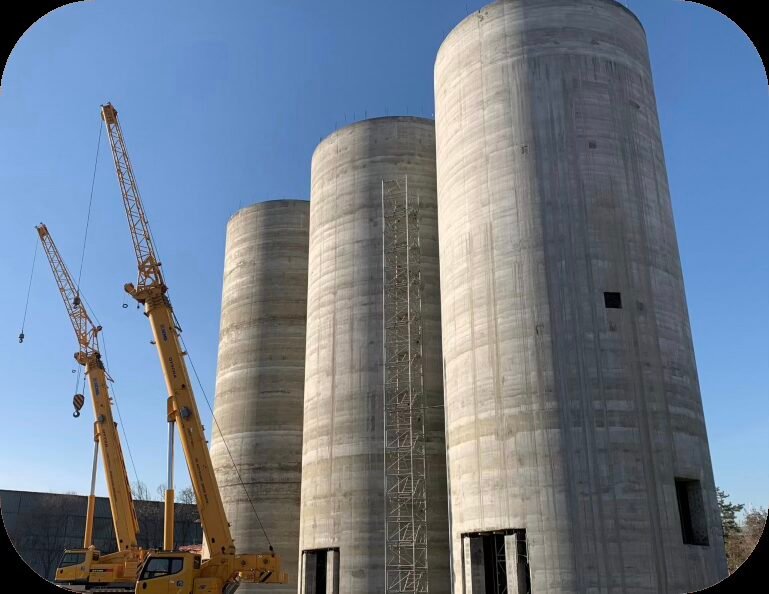
Completed Project Reference – KDT Industry
Introduction: Delivering High-Efficiency Cement Production
The Tashkent 100 TPH Cement Grinding Station Plant Project demonstrates the region’s growing commitment to industrial expansion, infrastructure development, and sustainable construction materials. With a capacity of 100 tons per hour (TPH), this grinding station enhances local cement production, reduces reliance on imports, and strengthens the construction supply chain.
KDT Industry supported this project by supplying fuel and water storage systems, chemical storage tanks, and heavy-duty steel fabrication, ensuring the facility operates with maximum reliability, efficiency, and compliance with international standards.
Project Scope and Objectives
Grinding stations play a critical role in cement production, turning clinker and additives into finished cement. KDT Industry’s objectives for the Tashkent project included:
- Delivering fuel storage tanks for generators and auxiliary plant equipment.
- Installing water storage and treatment systems for cooling, dust suppression, and fire safety.
- Providing chemical storage tanks for grinding aids and additives.
- Manufacturing steel structures for conveyor systems, silos, and auxiliary facilities.
- Ensuring compliance with international cement industry safety and environmental standards.
These contributions enabled the plant to operate as a high-capacity and sustainable cement grinding station.
Engineering and Manufacturing Excellence
Grinding stations demand precision-engineered systems to ensure efficiency, durability, and sustainability. KDT Industry applied advanced expertise to deliver:
- Fuel Storage Systems: Large-capacity tanks designed for continuous operation of grinding units.
- Water Storage Infrastructure: Supporting both cooling systems and environmental dust control.
- Chemical Storage Units: Safe storage solutions for grinding additives, including corrosion-resistant linings.
- Steel Fabrication: Heavy-duty conveyor galleries, storage silos, and support structures.
- Protective Coatings: Anti-corrosion and abrasion-resistant finishes extending service life.
- Compliance: All solutions manufactured according to ASME, API, ISO, and EU cement regulations.
With these solutions, the Tashkent plant achieved world-class grinding efficiency.
Challenges and Solutions
The project presented multiple technical and environmental challenges:
- High Capacity (100 TPH) – Continuous operations demanded strong, durable infrastructure.
- Dust Emissions – Grinding processes produce significant dust requiring suppression systems.
- Additive Handling – Chemicals used in grinding aids required safe storage and management.
- Environmental Standards – Compliance with Uzbekistan’s and international regulations was essential.
KDT Industry’s Solutions:
- Delivered reinforced silos and conveyors capable of handling continuous throughput.
- Installed water-based dust suppression systems for environmental compliance.
- Designed chemical storage with advanced containment systems for additives.
- Applied prefabricated modular construction to accelerate installation.
These measures ensured smooth plant operations with high efficiency and low environmental impact.
Contribution to Regional Development
The Tashkent Cement Grinding Station directly contributes to Uzbekistan’s economic and infrastructure growth. KDT Industry’s role supported:
- Local Cement Supply: Reducing dependence on imports and stabilizing supply.
- Infrastructure Expansion: Providing cement for roads, housing, and industrial projects.
- Job Creation: Supporting skilled labor development and industrial expertise.
- Export Competitiveness: Strengthening Uzbekistan’s role in regional cement markets.
This project highlights KDT Industry’s ability to deliver strategic industrial infrastructure worldwide.
Sustainability and Long-Term Value
Sustainability was a key design consideration for the project. KDT Industry ensured:
- Durable Infrastructure: Long-life storage and steel systems reducing lifecycle costs.
- Recyclable Steel Structures: Supporting circular economy principles.
- Water Efficiency: Recycling water in cooling and dust suppression systems.
- Environmental Compliance: Meeting EU and international emission control regulations.
These measures guarantee that the Tashkent grinding station remains a sustainable, future-ready facility.
Why KDT Industry Was Chosen
The project stakeholders selected KDT Industry for its expertise in cement industry infrastructure and heavy industrial engineering. Key reasons included:
- Cement Sector Experience – Successful references in clinker production lines and grinding stations.
- Engineering Reliability – High-performance systems designed for continuous operation.
- Safety and Compliance – Full adherence to international safety and environmental regulations.
- Reputation for Excellence – Trusted global partner in industrial and cement infrastructure.
This collaboration reinforced KDT Industry’s role as a strategic partner in cement production development.
Looking Ahead
The Tashkent 100 TPH Cement Grinding Station Plant Project is a prestigious reference in KDT Industry’s portfolio. It demonstrates our ability to deliver innovative, efficient, and sustainable infrastructure for cement production worldwide.
As demand for high-quality cement grows across Asia, KDT Industry stands ready to provide cutting-edge engineering solutions for grinding stations, clinker lines, and cement plants internationally.
This project strengthens our role as a global leader in cement industry infrastructure.

